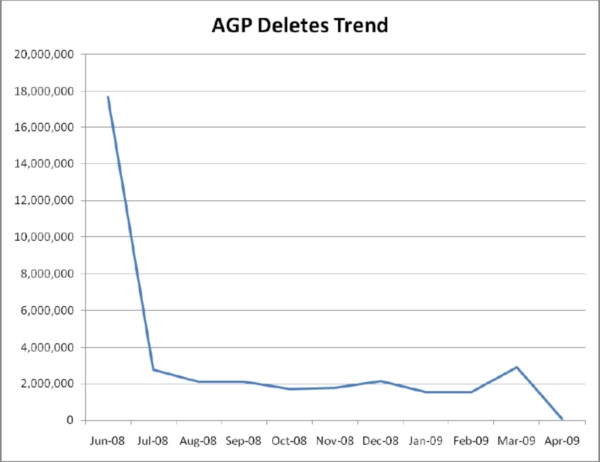ICANN: 'Domain tasting' practice declined to near-zero in April
Perhaps you've noticed this yourself: Whenever you mis-type a URL with a name that's maybe one letter off from the proper one, you no longer get directed to a site with a zillion ads that masquerades as the real one that you've never seen before, and that you may never see again. While the practice of cybersquatting hasn't necessarily subsided, the Web had been suffering from a plague of domain tasters -- sites that set up shop on sound-alike URLs for five days at a time, or even less, knowing they could revoke their URL registrations within that "add grace period" (AGP) without paying a fee.
In the meantime, these domain testers could reap the rewards of serving up dozens of cheap pop-under ads, and maybe even planting a few bots in the process. It was getting so bad that the number of misappropriated URLs cancelled within ICANN's five-day AGP, for one month in early 2007, approached 50 million. And as few as ten registrants were responsible for the lion's share of those one-off names.
The solution reached in June 2008 by ICANN, the non-profit agency responsible for the world's top-level domains, was very simple and very social: Charge registrants for "excessive AGP deletes" -- generally, for more than 70 deletions for every 1,000 registered names. As a result, according to an ICANN report released yesterday (PDF available here, the number of AGP deletes fell by as much as 84% in just the first month after the new policy took effect.

About 17.67 million AGP deletes were reported in June 2008. That number declined to 2.79 million in July, and then all the way to a paltry 58,218 in April 2009.
In a statement yesterday, ICANN CEO Rob Beckstrom used the good news as an illustration for how his institution could succeed in working with the greater Internet community to solve critical problems, as opposed to working under government oversight: "This shows the power of the Internet community working together," Beckstrom said. "The problem was identified and then a solution produced that has effectively seen the death of domain tasting in less than a year. In this case the study into tasting was prompted by representatives of the user community in ICANN, known as the At-Large community...It is enormously gratifying to see how collective responsibility, coordination and problem-solving can remove a potential for profit-making abuse of the domain name system so quickly. It is yet another piece of proof that ICANN's multi-stakeholder model of decision-making works and works well."
